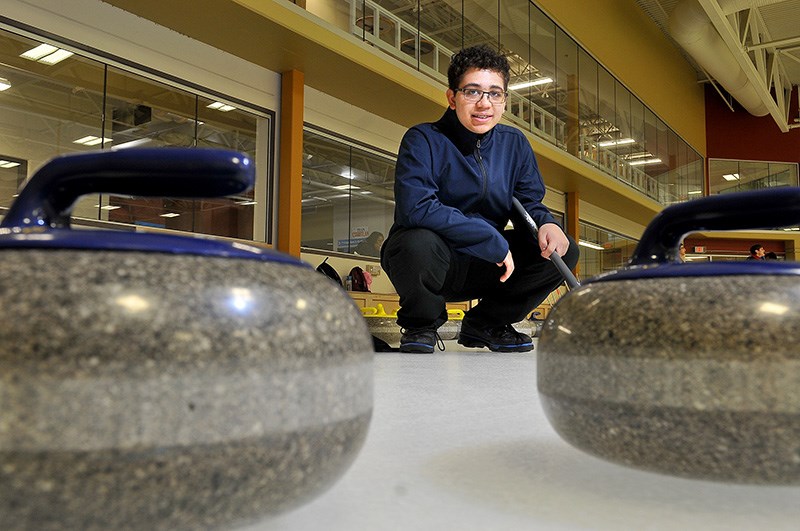For Caleb Simpson, curling is more than throwing a rock.
It is his rock.
For 12 of his 17 years, the Coquitlam teen has migrated to curling rinks in New Westminster, Coquitlam, Langley and Surrey, first to learn the game, then to get better at it. The friends he made there, the community of teammates, opponents and coaches, has become like a second family.
And when things in his own family suddenly started to go sideways, the 10 hours or so he spent at the curling rink every week, the routine of practice and competitions, became his refuge, his port in the storm of chaos that descended when his father, John, was diagnosed with post-traumatic stress disorder (PTSD).
Caleb was six years old — a year into his curling journey — when his dad started to pay the price for his 10-year tour in the Canadian military that included a peacekeeping stint in Sarajevo in the mid 1990s where his unit was charged with clearing the airport so flights carrying humanitarian aid and supplies to help rebuild the city could land.
But the peace between warring Bosnians and Serbs that had cost the lives of 14,000 people during the nearly four years the city was besieged was an uneasy one. Simpson and his comrades were under constant threat of sniper fire. Sometimes their work was derailed by artillery shells.
John returned to civilian life, married Vanessa — whom he’d met as a pen pal while he was stationed in Europe — settled in B.C. and started working as a bus driver. He thought the horrors of war were behind him. Until a couple of injuries prevented him from working for a stretch and his idled mind started to think. It was as he gave a Remembrance Day talk about his military experience to a troop of cub scouts, the terror of being under fire came flooding back.
It was, Vanessa said, like a bomb went off in the family.
At first John retreated, stifling the memories with hours and hours of sleep. He couldn’t motivate himself to accomplish even the simplest of tasks. His short-term memory failed him.
Then came the anxiety and nightmares, often triggered by loud, unexpected noises like fireworks at Halloween.
Caleb didn’t understand what was going on. But the dad he used to know had somehow changed. He compensated for his dad’s inability to function by becoming almost his opposite — hyper motivated, keeping himself busy and distracted almost every waking moment.
It was only at the curling rink Caleb could fully relax. Amongst his fellow curlers he felt safe, supported, free from judgement. Even at his biggest competitions, curlers shared information about opponents, exchanged tips to improve their game.
Sliding the 40-pound rock was exhilarating, sweeping was fun — especially when he saw the effect his effort could have on the movement of the rock down the ice.
Caleb’s mom, as well, enjoyed the predictable, structured routine of driving him to and from practices and competitions. Those moments in the car, and hours in the lounge as Caleb practiced, were her respite from the hard work of advocating for her husband’s health and well-being in a medical system that doesn’t always understand PTSD.
More importantly, she appreciated the life lessons of teamwork, camaraderie, understanding and hard work Caleb was learning at the rink — lessons that would serve the family well as they navigated their way through John’s illness.
To strengthen his bond with the game, Caleb attended clinics so he could also become a coach. He switched schools so he could play for the curling team at Centennial secondary.
That dedication has reaped benefits — at the rink and at home.
On March 1 to 3, Caleb will curl for his school at the high school provincials at the Royal City Curling Club in New Westminster. Two weeks later, he’ll be part of Sean Habkirk’s rink competing at the BC boys U18 provincials in Salmon Arm. If they win, they’ll represent BC at the U18 national championships being held in St. Andrews, N.B. in April.
At home, the family has emerged from the darkness, fought their way back to normalcy as a team. Not unlike throwing a game-saving double-angle raised takeout.



